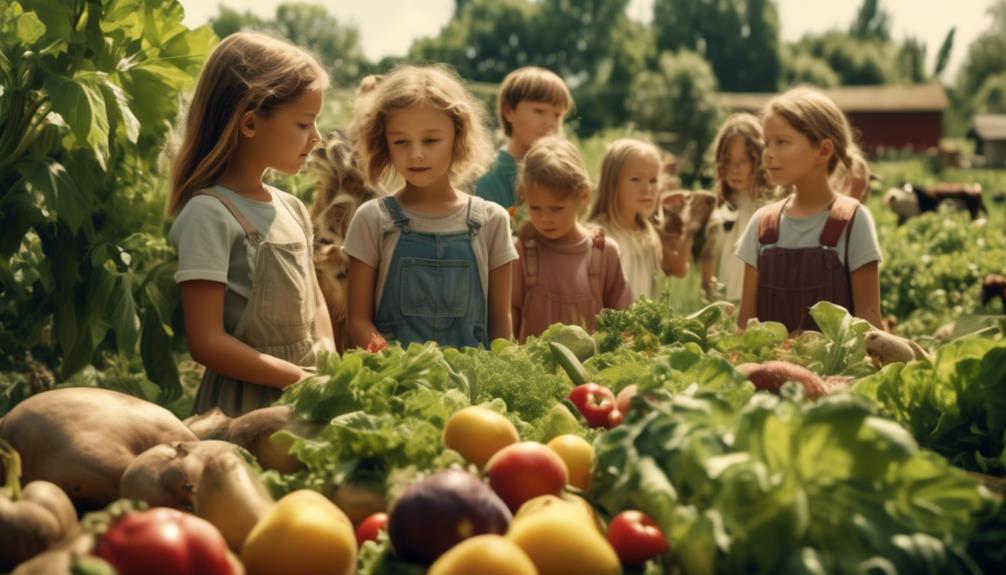Why Teaching Kids About Food Sources Matters

Teaching kids about food sources matters because it promotes healthy choices.
It connects them with nature.
It empowers them to make informed decisions.
Ultimately, it shapes the future of our food system and the well-being of our planet.
The Importance of Food Education
Understanding the significance of food education is crucial in promoting healthier eating habits and making informed food choices. By providing individuals, especially future generations, with knowledge about healthy eating habits, food education plays a vital role in shaping a healthier society. It equips individuals with the necessary tools to make informed decisions about the food they consume, leading to improved overall health and well-being.
Food education not only promotes healthier eating habits but also empowers individuals to take control of their own health. By understanding the impact of advertising on food choices, individuals can make conscious decisions to prioritize nutritious options over unhealthy ones. Moreover, through hands-on experiences with food sources, food education encourages individuals to establish a deeper connection with their food. This connection fosters an appreciation for the efforts of local farmers and supports sustainable practices in food production.
Building a Foundation for Healthy Choices
To build a strong foundation for healthy choices, it's essential to involve children in hands-on experiences with food sources. By teaching kids about where their food comes from, we can empower them to make healthier choices and counteract the influence of unhealthy food marketing.
Here are two ways to engage children in understanding food sources and making healthy choices:
- Growing and preparing food: When kids participate in growing their own fruits, vegetables, and herbs, they develop familiarity and appreciation for healthy options. Gardening allows them to witness the journey from seed to plate, connecting them to the source of their food. Additionally, involving children in meal preparation teaches them important cooking skills and encourages them to choose nutritious ingredients.
- Collaborating with schools: Working with schools to incorporate food education into the curriculum can drive broader change. By integrating lessons on food sources and healthy choices, children can learn about the importance of supporting local agriculture and making sustainable food choices. This collaboration not only benefits the students but also supports local farmers and the community as a whole.
Understanding the Journey of Food
Children often have limited knowledge about where their food comes from, making it crucial to educate them about the journey of food. Understanding the process of food production fosters appreciation for farmers and the effort involved. By studying the food chain, children can discover the interconnectedness of the world. They begin to recognize that everyone relies on the same natural resources, promoting equality and a sense of shared responsibility.
When children learn about the journey of food, they gain awareness of the farm-to-fork process. They come to understand that their food doesn't simply appear on supermarket shelves, but is the result of hard work by farmers, growers, and producers. This understanding fosters gratitude and empathy towards those who grow and rear their food, encouraging children to value the efforts of these individuals.
Educating children about the journey of food also helps them make informed choices about what they eat. They learn about the importance of sustainable farming practices, organic produce, and the impact of their food choices on the environment. This knowledge empowers them to make healthier and more responsible decisions, not only for themselves but for the planet as well.
Connecting Kids With Nature
Get ready to explore the great outdoors with your kids!
Outdoor exploration has numerous benefits, including physical activity and the development of environmental awareness. By connecting kids with nature, you can help them understand the importance of preserving our natural resources and the impact it has on food sources.
Outdoor Exploration Benefits
Engaging in outdoor exploration allows kids to connect with nature, develop an appreciation for the environment, and learn about the process of food production.
Here are some ways outdoor exploration benefits children and helps them understand the natural world:
- Hands-on gardening and farming activities foster valuable life skills such as responsibility, patience, and teamwork.
- Visits to farms and interactions with animals provide practical insights into food production, helping children understand where their food comes from.
Environmental Awareness Development
Connecting kids with nature through outdoor exploration and hands-on experiences is essential for developing environmental awareness. By teaching children about food sources, we can help them understand the importance of natural resources and the interconnectedness of the world.
Learning about the food chain and where our food comes from fosters appreciation for farmers and the environment. This knowledge can inspire children to value and protect natural resources, promoting an environmentally-friendly lifestyle and addressing the climate crisis.
Additionally, connecting with food sources encourages healthy eating habits, physical activity, and overall wellness. Farm visits, hands-on activities, and growing produce at home provide educational experiences and practical insights into food production.
Promoting Sustainability and Conservation
Promoting sustainability and conservation can lead to a healthier lifestyle and support local agriculture through conscious food choices. By understanding where our food comes from and how it's produced, we can make informed decisions that benefit both ourselves and the environment. Here are some ways in which promoting sustainability and conservation can make a difference:
- Empower kids: Involving children in the growing process alongside farmers can empower them to make sustainable choices. When they see firsthand the effort and care that goes into growing food, they're more likely to appreciate its value and make conscious decisions.
- School involvement: Schools play a crucial role in providing meals to vulnerable children. By sourcing food from local farmers and teaching students about sustainable practices, schools can drive broader change. Students can also be encouraged to participate in gardening projects or visit farmers markets to reconnect with the natural food cycle.
- Raise awareness: Promoting sustainability and conservation helps raise awareness about the benefits of knowing where our food comes from. By understanding the impact of our food choices on the environment, we can make more sustainable decisions that support local agriculture and reduce our carbon footprint.
Promoting sustainability and conservation isn't just about making healthier choices for ourselves, but also about serving others and protecting the planet. By educating kids about food sources and encouraging conscious food choices, we can create a more sustainable future for everyone.
Empowering Kids to Make Informed Decisions
By involving children in the growing process alongside farmers, they can be empowered to make informed decisions about their food choices and develop a deeper appreciation for the origins of their meals. Encouraging hands-on experiences with food origins promotes trying and choosing healthy foods. When kids see the hard work and care that goes into growing their food, they're more likely to value and select nutritious options. Involving kids in the growing process alongside farmers not only gives them a sense of ownership and pride but also teaches them the significance of supporting local farmers through their food choices. When children understand that their food comes from nearby farms and that their choices directly impact those farmers, they're empowered to make conscious decisions that benefit their community.
To further empower kids, incorporating food education into school curricula is essential. By teaching kids about food sources, they gain knowledge about the various types of food available, their nutritional value, and the environmental impact of their choices. This education establishes lifelong healthy habits and equips children with the information they need to make informed decisions about what they eat.
Raising awareness about the benefits of knowing where food comes from is crucial in empowering informed decision-making. When children understand the origins of their meals, they can make choices that align with their values, such as supporting sustainable farming practices or choosing organic options. By empowering kids to make informed decisions, we're equipping them with the tools they need to lead healthier lives and make a positive impact on their communities.
Creating a Positive Impact on the Future
Understanding the origins of our food has the power to shape a healthier and more sustainable future for generations to come. By teaching kids about food sources, we can create a positive impact on the future in the following ways:
- Promoting healthier choices: Multi-billion dollar advertising often promotes unhealthy food options. However, when children understand where their food comes from, they're more likely to try and choose healthier options. Hands-on experiences with food origins can be a powerful tool in encouraging them to make informed decisions about their diet.
- Supporting local farmers and sustainable agriculture: Teaching kids about food sources helps them connect their food choices to supporting local farmers and sustainable agriculture. This not only benefits the environment but also strengthens local economies and communities.
Frequently Asked Questions
Why Is It Important to Teach Kids About Where Food Comes From?
Teaching kids about where food comes from is like opening a treasure chest of knowledge. It helps them appreciate nature, make healthier choices, and understand the impact of food production on the environment.
Why Should We Teach Children About Food?
Teaching children about food has numerous benefits. It provides education on nutrition, helps them make healthier choices, and supports local farmers. Understanding food sources is essential for their overall well-being.
Why Are Food Sources Important?
Understanding food sources is essential for your health, as it helps you make informed choices. By knowing where your food comes from, you can support sustainable practices and engage with your community, creating a positive impact on both yourself and others.
Why Is It Important to Know Where the Sources of Food Are Coming From?
Knowing where your food comes from is important because it increases awareness about the sources of your food, promotes a healthier lifestyle, and supports local agriculture, which benefits both your health and the community.










